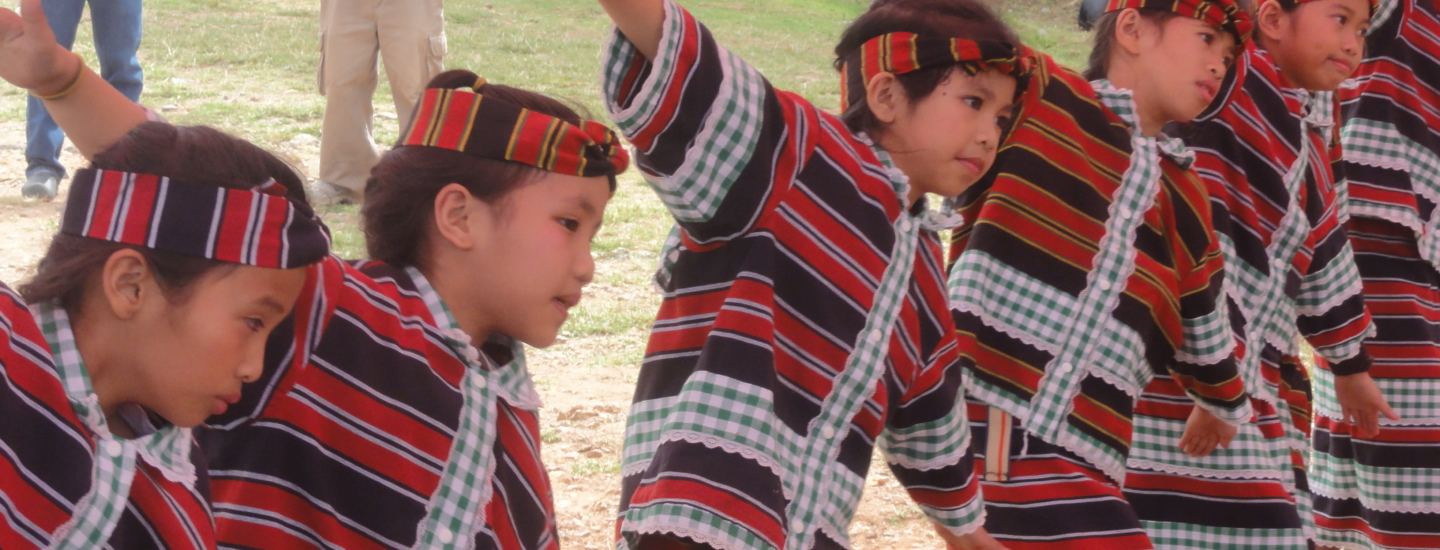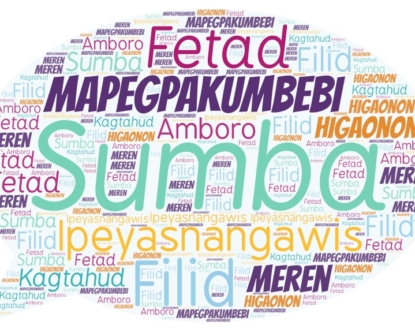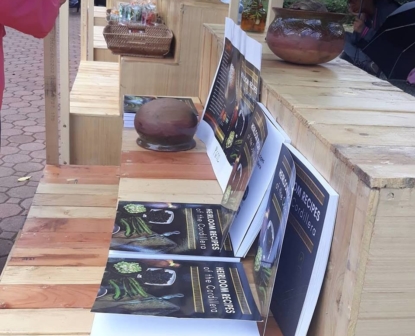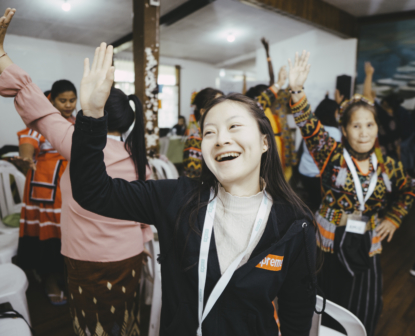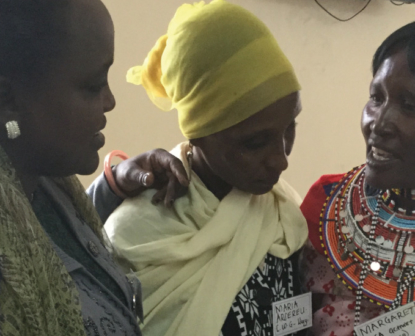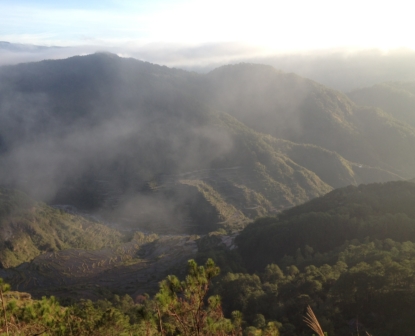Project
Indigenous Knowledge of the Cordillera
-
Amount Funded
65,000 EUROProject Duration
15 Nov 2017 - 14 Nov 2019 -
-
Lead organisation
-
The Philippines Task Force for Indigenous Peoples’ Rights (TFIP ) is a network of 11 non-government organisations, many of which are educational in nature, working with indigenous peoples in the Philippines. The network aims to achieve its vision of a progressive society that promotes and defends indigenous peoples’ rights, and where Indigenous Peoples (IP) participate in genuine national development while freely exercising their rights and self-determined development. Since TFIP started in 2001, it has steadily built its name and credibility at the national level as an advocate of indigenous peoples’ rights. It has conducted participatory research on the state of IP food security, indigenous knowledge, sustainable agriculture, customary law, and land use. Through its practice, it has enhanced the capability of its partners as well as indigenous leaders in doing research and policy advocacy through actual practice, trainings and exchange programmes. It has networked and collaborated with government policymakers and legislators, academic institutions and individuals, as well as advocates’ networks and IP organisations and federations working on common issues and campaigns. It has done extensive information dissemination of its research highlights and conducted education and information campaigns on indigenous peoples’ rights through the mainstream media, website, social media and various public fora.
-
Organisation
The Philippines Task Force for Indigenous Peoples’ Rights (TFIP ) is a network of 11 non-government organisations, many of which are educational in nature, working with indigenous peoples in the Philippines. The network aims to achieve its vision of a progressive society that promotes and defends indigenous peoples’ rights, and where Indigenous Peoples (IP) participate in genuine national development while freely exercising their rights and self-determined development. Since TFIP started in 2001, it has steadily built its name and credibility at the national level as an advocate of indigenous peoples’ rights. It has conducted participatory research on the state of IP food security, indigenous knowledge, sustainable agriculture, customary law, and land use. Through its practice, it has enhanced the capability of its partners as well as indigenous leaders in doing research and policy advocacy through actual practice, trainings and exchange programmes. It has networked and collaborated with government policymakers and legislators, academic institutions and individuals, as well as advocates’ networks and IP organisations and federations working on common issues and campaigns. It has done extensive information dissemination of its research highlights and conducted education and information campaigns on indigenous peoples’ rights through the mainstream media, website, social media and various public fora.
-
Project
Keeping Alive the Wisdom of the Cordillera Indigenous Peoples is a 2-year project of TFIP that focuses on the documentation and promotion of indigenous knowledge in the Cordillera region, with the aim of contributing to culture-rooted education for indigenous youth. This is made possible through collaboration among indigenous elders, women, youth, learning institutions, educators and peoples’ organisations. The project maximises the use of storytelling in capturing indigenous knowledge, and documents it into storybooks. TFIP innovates by linking up with educators and learning institutions in the keeping alive of indigenous wisdom as a continuing source of guidance. It maximises the newly opened spaces for indigenous learning in the educational system made possible by Philippine educational policies. The project is highly collaborative, linking with indigenous knowledge holders, artists, writers, people’s organisations and educators, and using a mix of creative and multimedia forms to engage the youth and capture their interest and involvement. This project responds to the need for popular educational material on indigenous knowledge, which can be used by schools.
-
Learning
-
-
Keeping Alive the Wisdom of the Cordillera Indigenous Peoples is a 2-year project of TFIP that focuses on the documentation and promotion of indigenous knowledge in the Cordillera region, with the aim of contributing to culture-rooted education for indigenous youth. This is made possible through collaboration among indigenous elders, women, youth, learning institutions, educators and peoples’ organisations. The project maximises the use of storytelling in capturing indigenous knowledge, and documents it into storybooks. TFIP innovates by linking up with educators and learning institutions in the keeping alive of indigenous wisdom as a continuing source of guidance. It maximises the newly opened spaces for indigenous learning in the educational system made possible by Philippine educational policies. The project is highly collaborative, linking with indigenous knowledge holders, artists, writers, people’s organisations and educators, and using a mix of creative and multimedia forms to engage the youth and capture their interest and involvement. This project responds to the need for popular educational material on indigenous knowledge, which can be used by schools.
-
The Task Force for Indigenous Peoples Rights (TFIP) and Partners for Indigenous Knowledge Philippines (PIKP) worked tirelessly towards the documentation and promotion of indigenous knowledge in the Cordillera region supported by a Voice grant. Several key issues informed the project activities. Among these the questions were:
- What are the indigenous values in different communities in the Cordillera that need to be enhanced, strengthened and transmitted to the younger generation?
- How can community people effectively transmit their indigenous knowledge for learning by the youth?
- How can we collaborate with educational institutions and people’s organizations for the effective transmission of this knowledge?
- What are effective methodologies of teaching and learning this valuable indigenous knowledge in schools and communities?
With storytelling as their main approach to capture valuable indigenous knowledge, they were able to produce two books, namely a cookbook titled “Heirloom Recipes of the Cordillera” and “Daddad-at ëd Itogon”, which is a compilation of stories from different indigenous communities in the region. Through this approach, indigenous educators, community people and youth have increased access to culture-rooted education. The organizations were able to link up with various local government institutions such as the National Nutrition Council and the Department of Tourism.
As a result of the project, indigenous peoples in Itogon, including teachers, students and community members are writing their own stories. The process of coming up with the book Daddad-at ëd Itogon inspired and challenged others to write and come up with their own publications. For example, the officials and elders of Barangay Tuding, Itogon plan to write their own book on their history, indigenous knowledge and practices in their community. The plan was launched through a ritual performed by the community, which also served as the closing ritual for this project. Ultimately, there is an increased number of IP communities, peoples’ organizations, educators and officials that are aware of the importance of indigenous knowledge and are actively engaged in project activities. The good news is that the teaching has been extended beyond formal teachers, other members of the community are also taking up the task of teaching. The project brought together community craftsmen and knowledge holders in one place where they could teach and share their knowledge. Teachers learned from community people and other groups skilled in various forms of indigenous knowledge. The food exchange workshop was one of the effective approaches in engaging their stakeholders. They plan to continue developing creative ways of linking and engaging different groups and communities to further contribute to a culturally-rooted education for indigenous youth. They continue to preserve indigenous knowledge, culture and heritage in creative ways, such as this music video series called “Kasiyana”. TFIP and PIKP have met many other groups and individuals who are very much interested in linking up with them and learning from their experience in promoting and transmitting indigenous knowledge.
Quotes
“The whole process of working with the school, barangay, elders and community members on coming out with a book is an innovative approach that we have been able to use through this project. Multi -sectoral participation in coming out with the book makes the process collective and easier because of contributions from many people. We underwent the rituals required by the community in doing the project, which facilitated cooperation with the community and school. The holding of traditional opening and closing rituals were documented and also served as a learning experience for the project team.”
“Meanwhile, outside the schools, there is a growing movement to revitalize the indigenous culture and the values of caring for the land and community, and respect for the unseen. Among the factors encouraging this is the presence of indigenous peoples ’movements nationally that are calling for greater assertion of indigenous peoples rights. Indigenous knowledge is also gaining international recognition through lobbying by indigenous peoples in UN conventions and environmental processes.”
Project brochure:
https://app.box.com/file/437008302745
https://app.box.com/file/437026290701
https://app.box.com/file/573443320264
The two books produced through the project:
https://voice.global/publications/food-a-way-to-a-communitys-soul/
https://app.box.com/file/606087806926
The Kasiyana playlist:
https://www.facebook.com/watch/838391839878948/3005450692916635
-
News

